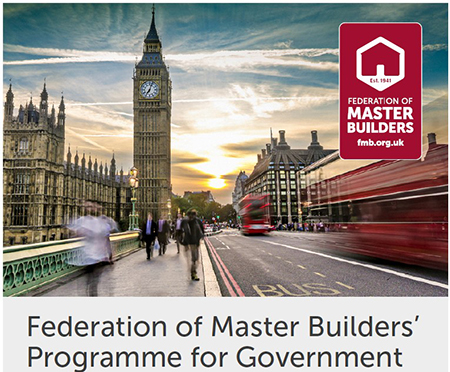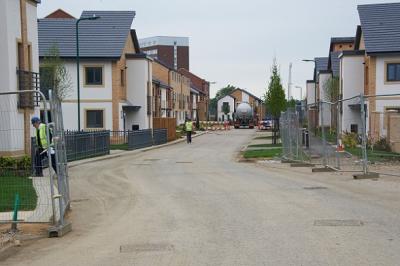FMB urge new UK government to address the skills shortage in the construction industry
 A new government must ensure the construction sector has enough skilled workers post-Brexit, or its housing and infrastructure manifesto pledges will be redundant, says the Federation of Master Builders (FMB).
A new government must ensure the construction sector has enough skilled workers post-Brexit, or its housing and infrastructure manifesto pledges will be redundant, says the Federation of Master Builders (FMB).
The FMB has called on all major political parties to recognise the importance of migrant labour to the construction sector as part of its ‘Programme for Government’.
Launched before Parliament was dissolved for the general election it includes the FMB’s five-point plan aimed at the next Government.
- Ensure that the construction industry has enough skilled workers
- Increase the supply of new homes
- Improve the quality of our new and existing homes
- Make our homes more energy efficient
- Boost growth among construction SMEs
Brian Berry, chief executive of the FMB, said: “The UK construction sector’s demand for skilled migrant workers from the EU and beyond cannot be overstated.
“In London alone, there are more than 157,000 non-UK construction workers constituting almost half of the industry’s workforce in the capital.
“Pre-Brexit, 60% of small construction firms are already having trouble hiring bricklayers and that’s before the UK abandons the free movement of people."
“If the next government implements an inflexible immigration system that hinders the ability of talented foreign construction workers from making their way to the UK, any manifesto pledges relating to the delivery of housing and infrastructure will be rendered meaningless.”
Find out about and register your interest in building control qualifications and apprenticeships
A trained UK workforce is necessary
He continued “In the longer term, the most sustainable solution to the chronic skills deficit is for employers to recruit and train more home-grown talent. Undoubtedly, the best way of achieving this is to focus on increasing the quality, duration and thoroughness of construction apprenticeships.”
“Giving technical and academic education ‘parity of esteem’, as the chancellor stated in the last budget, must be picked up and driven forward by the next government and it’s vital that the progress we’ve made on increasing the quality of apprenticeships does not go to waste.”
He concluded “For every £1 invested in construction, 92p stays within the UK and £2.84 is generated in the wider economy.
“As the economy adapts to the reality of operating outside of the EU, it’s more important than ever that the government works closely with strategic industries that offer high levels of productivity and a good return on investment. We urge all of the main political parties to include positive policies on immigration, skills and apprenticeships in their forthcoming manifestos.”
Further information
Immigration and skills key to the success of the next Government
Federation of Master Builders' Programme for Government
Modernise or die: Time to decide the future of the construction industry
Sign up to the building bulletin newsletter
Over 48,000 construction professionals have already signed up for the LABC Building Bulletin.
Join them and receive useful tips, practical technical information and industry news by email once every 6 weeks.
Subscribe to the Building Bulletin




Comments
(No subject)
Submitted 6 years 7 months ago
Lack of investment in training and a lack of trade apprenticeships.
If the proper investment is put in now, we should see a return in about 10 to 15 years, allowing for the necessary experienced trade persons to start making a difference. You reap what you sow!
Webmaster note
Submitted 6 years 7 months ago
Add new comment